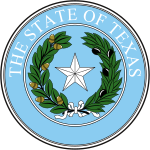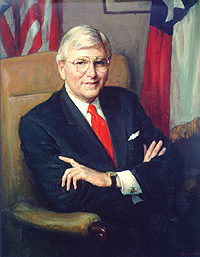
Mark Wells White Jr. was an American politician and lawyer who served as the 43rd governor of Texas from 1983 to 1987. He also held office as Secretary of State of Texas (1973–1977), and as Texas Attorney General (1979–1983).
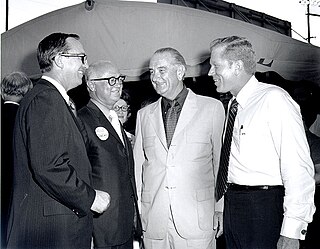
The Sharpstown scandal was a stock fraud scandal in the state of Texas in 1971 and 1972 involving the highest levels of the state government. The name came from the involvement of the Sharpstown area of Houston.
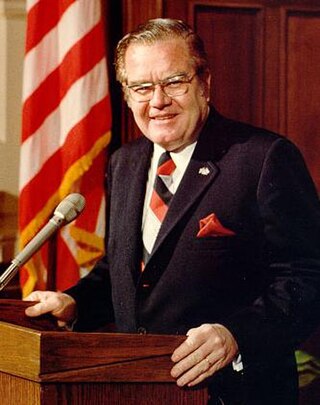
Dolph Briscoe Jr. was an American rancher and businessman from Uvalde, Texas, who was the 41st governor of Texas between 1973 and 1979. He was a member of the Democratic Party.

United States gubernatorial elections were held on November 5, 2002, in 36 states and two territories. The Republicans won eight seats previously held by the Democrats, as well as the seat previously held by Minnesota governor Jesse Ventura, who was elected on the Reform Party ticket but had since renounced his party affiliation. The Democrats won 10 seats previously held by the Republicans, as well as the seat previously held by Maine governor Angus King, an independent. The elections were held concurrently with the other United States elections of 2002.

The 2010 Texas gubernatorial election was held on Tuesday, November 2, 2010, to elect the governor of Texas. Incumbent Republican Governor Rick Perry ran successfully for election to a third consecutive term. He won the Republican primary against U.S. Senator Kay Bailey Hutchison and political newcomer, Debra Medina. The former mayor of Houston, Bill White, won the Democratic nomination. Kathie Glass, a lawyer from Houston and previous candidate for Texas Attorney General, won the Libertarian nomination. Deb Shafto was the nominee of the Texas Green Party. Andy Barron, an orthodontist from Lubbock, was a declared write-in candidate.

The 1990 Texas gubernatorial election was held on November 6, 1990, to elect the governor of Texas. Incumbent Republican Governor Bill Clements did not run for re-election, so the election pitted Democrat Ann Richards against Republican Clayton Williams. Richards narrowly defeated Williams on Election Day, winning 49.5% of the vote to Williams' 46.9%. As of 2022, this is the last time a Democrat or a woman was elected Governor of Texas. As of 2022, this is also the most recent time the Democratic candidate has carried Collingsworth, Childress, Wilbarger, Wichita, Archer, Throckmorton, Montague, Wise, Tarrant, Grayson, Lamar, Hopkins, Titus, Bowie, Harrison, Panola, Shelby, Jasper, Hardin, Angelina, Polk, Houston, Madison, Walker, Kaufman, Navarro, Henderson, Hill, McLennan, Williamson, Burleson, Waller, and Refugio counties. This the most recent Texas gubernatorial election in which both major parties' gubernatorial nominees have since died.

The 1998 Pennsylvania gubernatorial election was held on November 3, 1998. The candidates were incumbent Republican Tom Ridge, Democrat Ivan Itkin, Constitutionalist Peg Luksik and Libertarian Ken Krawchuk. Ridge, a popular moderate, won with 57 percent of the votes cast.

The 1978 Texas gubernatorial election was held on November 7, 1978, to elect the governor of Texas. In a surprising upset, Republican Bill Clements was narrowly elected over Democratic State Attorney General John Luke Hill, winning 50% of the vote to Hill's 49%. In doing so, Clements became the first Republican to be elected governor since Reconstruction in 1869.
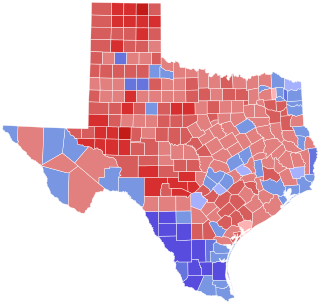
The 1986 Texas gubernatorial election was held on November 4, 1986, to elect the governor of Texas. The election was a rematch of the 1982 election, as incumbent Democratic Governor Mark White ran for reelection against former Republican Governor Bill Clements. Clements was elected to a second, non-consecutive term as governor, winning 53% of the vote to White's 46%. As of 2022, this is the last time Grimes and Chambers counties have voted for the Democratic nominee for governor.

The 1974 Texas gubernatorial election was held on November 5, 1974, to elect the governor of Texas. Incumbent Democratic Governor Dolph Briscoe was easily re-elected to a second term, winning 61% of the vote to the 31% of Republican Jim Granberry, the former mayor of Lubbock. Raza Unida candidate Ramsey Muniz won 6%, while the remaining 2% were cast for other candidates.

The 2014 United States House of Representatives elections in Texas were held on Tuesday, November 4, 2014, to elect the 36 U.S. representatives from the state of Texas, one from each of the state's 36 congressional districts. The elections coincided with the elections of other federal and state offices, including a gubernatorial election and an election to the U.S. Senate.

Ramiro Muñiz, known as Ramsey Muñiz, was an American political activist. Muñiz was a Mexican American who ran for governor of Texas in 1972 and 1974, each time as the nominee of the Raza Unida Party. He lost both elections to the Democrat Dolph Briscoe, a wealthy banker and landowner from Uvalde, Texas. He is the first Hispanic whose name appeared on a Texas gubernatorial general election ballot.
Peter J. O'Donnell Jr. was an American businessman, securities investor and philanthropist. From 1962 to 1969, he was the Texas Republican state chair. In 1963, he was also the national chair of the Draft Goldwater Committee.
Frederick Joseph Agnich was a Minnesota-born geophysicist who served from 1971 to 1987 as a Republican member of the Texas House of Representatives. From 1972 to 1976, he was the Texas Republican National Committeeman.

The 1968 Texas gubernatorial election was held on November 5, 1968, to elect the governor of Texas. Incumbent Democratic Governor John Connally did not run for reelection to a fourth term, so the election pitted Democrat Preston Smith against Republican Paul Eggers. Smith was easily elected, winning 57% of the vote to Eggers' 43%.

This article lists those who were potential candidates for the Democratic nomination for Vice President of the United States in the 1972 election. Coming into the 1972 Democratic National Convention, South Dakota Senator George McGovern had the delegate lead, but did not have the presidential nomination locked up. After winning the Democratic nomination for president on July 13, McGovern looked for a running mate. McGovern's first choice for vice president was Ted Kennedy, but Kennedy refused to join the ticket; Minnesota Senator Walter Mondale, Wisconsin Senator Gaylord Nelson, and Connecticut Senator Abraham A. Ribicoff also declined. McGovern offered the position to Missouri Senator Thomas Eagleton, who appealed to labor groups and Catholics, two groups that McGovern had alienated during the primary campaign. The ticket of McGovern and Eagleton was nominated by the 1972 Democratic National Convention. Following the convention, it was revealed that Eagleton had received treatment for depression in the 1960s. Though McGovern considered keeping Eagleton on the ticket, he ultimately chose to replace Eagleton with former ambassador Sargent Shriver. The McGovern–Shriver ticket lost the presidential election to the Nixon–Agnew ticket. After the controversy surrounding Eagleton, future campaigns spent much more time vetting vice presidential candidates.

The 1972 United States presidential election in Texas was held on November 7, 1972, as part of the 1972 United States presidential election. Incumbent Republican President Richard Nixon overwhelmingly won the state of Texas with 66.20% of the vote, to the Democratic Party candidate George McGovern's 33.24%, thus giving him the state's 26 electoral votes. This result made Texas 9.8% more Republican than the nation-at-large. This was the first time a Republican won the state of Texas since Texas-born Dwight D. Eisenhower won it in 1956. Even as Democrat Dolph Briscoe won the gubernatorial election on the same Ballot.

United States gubernatorial elections were held on November 8, 2022, in 36 states and three territories. As most governors serve four-year terms, the last regular gubernatorial elections for all but two of the seats took place in 2018 U.S. gubernatorial elections. The gubernatorial elections took place concurrently with several other federal, state, and local elections, as part of the 2022 midterm elections.

The 1946 Texas gubernatorial election was held on November 5, 1946.

The 1940 Texas gubernatorial election was held on November 5, 1940.

